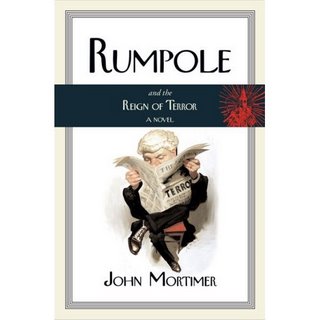



Due to the vast power we wield here at stevereads, our palatial offices are inundated with advance copies of all manner of forthcoming books. Of course we wish to look kindly on all these humble supplicants, but it isn't possible. They are too many, and, let's be frank, most of them are crap on a stick, unworthy of anyone's time or attention.
Even the good titles are too numerous to read, much less recommend - amd there's also the undeniable fact that some of the un-worthy titles are still perforce note-worthy, for their reach, for their subject, even for their particular failure.
It's a huge burden, and the only thing that allows us to shoulder it is our own absolute infallibility. Without that, we scarcely know how we'd muddle through.
Nevertheless, we DO muddle through! It's akin to a sacred duty, blazing the trail and sending back reliable dispatches for those who read slower than I do (which is everybody).
Of course, some of the noteworthy forthcomings are more problematic than others, even from a personal view. One such title is Elliot Perlman's "Reasons I Won't Be Coming," which comes out in paperback shortly.
Elliot was much-praised (and rightly so) for his novel "Seven Types of Ambiguity." This book is a collection of short stories, all of them strong, one or two of them nothing short of moving.
The conflict comes in around the edges because Elliot is currently mining the same white-suburband-privileged-youth market that three of my young friends are attempting to mine. So far, none of them has met with success in terms of a book contract (although all three have succeeded in terms of competency, and one of the three has achieved some scenes of genuine beauty), and that fact makes LIKING Elliot's books feel a trifle traitorous. Still, these are good stories, well worth your time.
Less worthwhile is Jeremy Black's new book "George III America's Last King" - Black is a ploddingly competent historian, but he knows nothing whatsoever about fluid storytelling and never has. King George III is a fascinating historical figure who ruled for a very long time and of course saw the parting of the American colonies from the British empire. His story has been undertaken many times, from many angles, but this particular undertaking fails on almost all counts. The writing is mediocre at best, and the research has large and curious gaps (almost like SOMEBODY lost a research assistant two-thirds of the way through).
There are good biographies of George III out there - although no great ones - but this isn't one of them. When a superb one eventually comes, you'll be sure to read about it here at stevereads. Until then, best to skim this volume on your local Barnes & Noble tables and move on. I absolve you of a guily conscience.
And speaking of guilty pleasures! There's a new book called 'Voyages of the Imagination,' in which editor Jeff Ayers presides over a staff who've devoted their time and energy to ... well, to the unthinkable.
They've read and summarized every single Star Trek novel ever written. Think about that last sentence. Every Star Trek novel ever written.
This isn't an inherently unbelievable goal. Your humble editor has, after all, read every single Star Trek novel that's ever been published (and, back in the old fanzine days, quite a few that weren't published) ... read them with care and attention, turning down pages, piecing it all together with far, far more thought than the subject matter deserves.
But we hardly expect anybody else to have done so, and the knowledge that somebody HAS prompts only a curious strain of pity.
Especially since this volume - undoubtedly the only one of its kind that'll ever exist - criminally softballs things. NONE of the near-innumerable books under examination here is given any kind of critical appraisal - understandably, since the last thing Paramount wants to authorize in this, Star Trek's 40th anniversary, is a cold-minded review of how loudly most Star Trek fiction in the last 30 years has SUCKED WAD. That's understandable on the studio's part, but still ... surely a relatively benign rating system could have been set up? A scale of one to five tribbles would surely have offended nobody, but it might have served as a much-needed guide for the wary reader.
And yet, some of the best Star Trek fiction is duly honored here, such as Sondra Marshak & Myrna Culbreath's 'Star Trek the New Voyages' and their wonderful little novels 'The Price of the Phoenix' and 'The Fate of the Phoenix' (their ill-starred novel 'Triangle' is also well worth seeking out and devouring), all big sentimental favorites here at Stevereads. Also there's Alan Dean Foster's adaptation of all the cartoon episodes; most of these episodes were atrocious - and all of them were only 30 minutes long - but Foster lavishes inordinate amounts of care fleshing them out, with results that get more rewarding as his series progresses.
No, 'Voyages of the Imagination' is a bit of a disappointment, although even now, in its gelded state, it's a prodigious trek down memory lane and deserves a place on the shelf right next to the Star Trek Encylopedia. For a book-by-book critical rundown of every Star Trek novel ever written (in how many novels has Doctor M'Benga gone crazy and become the villain? How many different novels have ice-queen T'Pring trying to bring down the Federation just to get Spock's attention? How many different origins have been given for the enigmatic Number One?), you're all just going to have to wait until Stevereads gets around to doing it.
The last item under examination here is by far the sweetest: John Mortimer's new book "Rumpole and the Reign of Terror."
Mortimer is very old (we don't have the exact number at our fingertips, but he's got to be pushing seventy), and he's known for decades that he's succeeded in one of the rarest tasks of any author: he's created an immortal character. In most people, this would create a certain tendency to rest on one's laurels.
Not so Mortimer. His latest Rumpole book (a novel rather than the more usual collection of short stories) is one of the strongest stories he's ever told, every bit as trenchant and hilarious as the earliest stories were, decades ago - maybe even a bit moreso.
In this latest book, battered but unbowed Old Bailey hack Horace Rumpole defends a Pakistani doctor who's been accused by the Homeland Security drum-bangers of being an al-Qaeda operative. As readers of the series well know, Rumpole never pleads guilty - so we're off to the races.
I confess, I started the book with a bit of trepidation. One of the sweetest pleasures of entering the Rumpole universe is how TIMELESS it is: the chambers of Number 3 Equity Court will always be overcrowded to the point of chaos; Chateau Thames Embankment will always flow at Pomeroy's wine bar; Judge Graves ('my hearing is exceptionally keen'), Judge Bullingham ('Mr. Rumpole, that was an outrageous thing to say'), and Judge Oliphant ('Use your common sense') will always headline Rumpole's courtroom rogues gallery; She Who Must Be Obeyed will always loom over the flat in the Gloucester Road like Attila the Hun in sensible shoes.
I worried that the introduction of 'relevant' elements - al Qaeda and homeland security - would burst that bubble, with negative effects (surely I'm not the only one who wishes Watson had never moved out of 221b Baker Street, much less that an aged Holmes had ever felt 'an east wind' blowing).
I needn't have worried, and the relief was only deepened by the quiet perfection of it all. Who better than Rumpole, I quickly realized? Who better to stand up in a court of law in his dirty wig and soiled waistcoat and make a jury by turns laugh and rage at the silly, paranoid fascism of the times?
"Rumpole and the Reign of Terror" is a wonderful book and a deceptively easy read. As with all Rumpole books, absolutely no knowledge of the previous volumes is necessary - so here's an hearty encouragement for all of you, fans and newcomers alike! This little book won't disappoint.
And there we have it for now, yet another romp through book-land! More to come, as always ...

7 comments:
Here I comment again about how much I like the book posts. Keep 'em coming.
God, what a suck-up.
(Just kidding! Check the comments of the previous post.)
Please, everybody: more sucking up. I'm writing for response here ...
Enjoyed the post, Steve ('tis better to be a suck-up than a 'jerk'?)... Keep muddling through, and we'll keep reading...
I'd tell you what my favorite Star Trek novel was, but it's 'Next Generation', so I probably shouldn't go there.
The only good Next Generation novel is GREAT, and it's only great because it's HIJACKED by the REAL Enterprise crew. Of course I refer to Diane Carey's fantastic 'Ship of the Line.'
But no! By all means Kevin - tell us all what YOUR candidate is! What's the worst that could happen?
Okay, but you're gonna make fun of me...
It's called "Metamorphosis" by Jean Lorrah. The premise is simple - Data turns human. The how is not the interesting part; the reason I enjoyed it was that in seeing the world through Data's newly-human eyes, we get an intriguing glance at what it's like to live on the Enterprise D, as Data suddenly is confronted with new (mundane) challenges (knowing when to use the bathroom! Choosing a hair gel ((he decides to have the computer generate whatever Riker uses))!). Overall, not a great book, but I found that section interesting.
Keep in mind, I've only read two Star Trek novels. The other was by Peter David, who I'm not a huge fan of.
Post a Comment